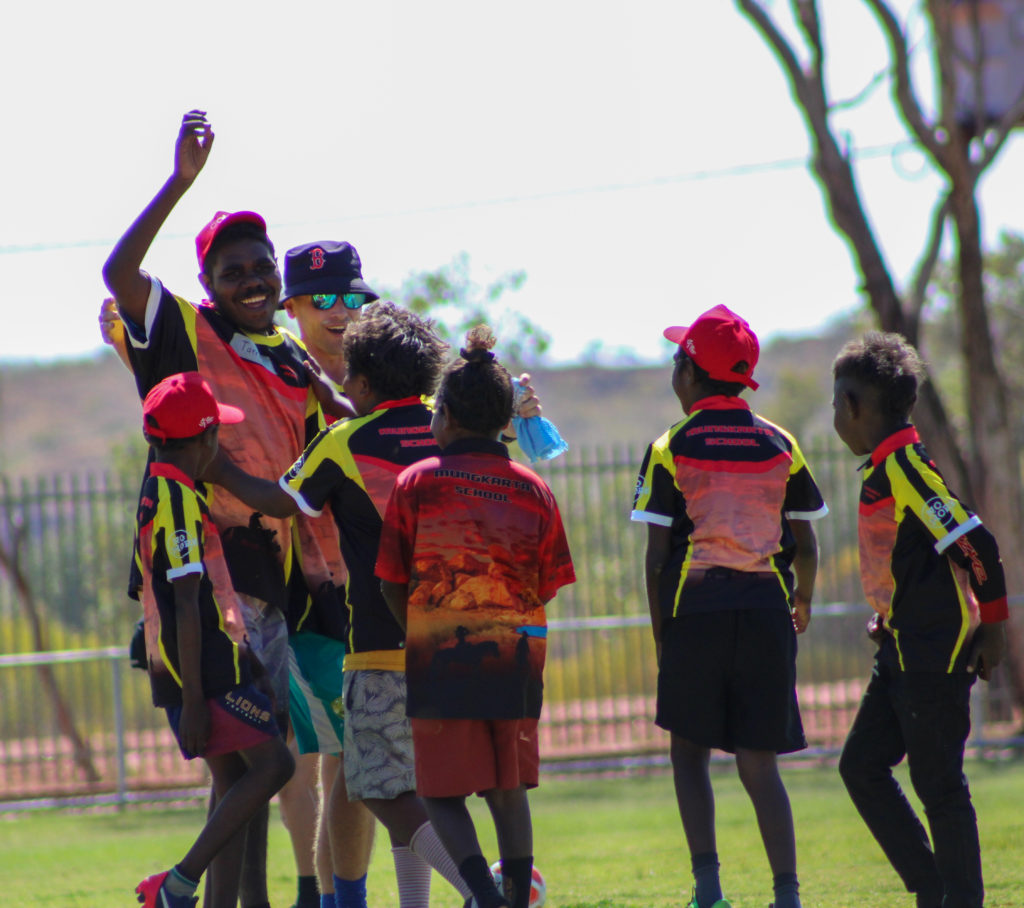Blind and vision impaired Aboriginal children find a love of playing football
May 18, 2022
A new partnership between John Moriarty Football and Australian Blind Football, will ensure blind and vision impaired Aboriginal children in some of Australia’s most disadvantaged and remote communities will have the opportunity to participate in a game changing football initiative.
According to Australian Indigenous HealthInfoNet, eye and vision problems are the most common long-term health conditions experienced by Aboriginal and Torres Strait Islander people.
Thanks to the John Moriarty Football (JMF) and Australian Blind Football (ABF) partnership blind and vision impaired (BVI) Aboriginal children will be able to participate in JMF’s transformational program through the use of audible balls. It will also facilitate coach education to build knowledge and capacity to provide football opportunities for people who are blind or partially sighted.
JMF Co-Founder and Co-Chair and the first Indigenous footballer to be selected for Australia, Yanyuwa man John Moriarty AM, said, “This partnership with ABF is game changing. Improving access to the game of football is paramount to us at JMF.”
“Our program is designed to address the barriers of football participation for Aboriginal girls and boys in remote and regional communities, whether they are caused by remoteness, lack of sporting facilities, economic disadvantage, and now, vision. We know that football has the power to unlock the potential of Indigenous children, just as it did for me.”
Each week JMF delivers to over 2,000 Indigenous girls and boys aged 2 to 18 years in 19 remote and regional communities in New South Wales, Queensland and the Northern Territory.

JMF Tennant Creek Community Coach Warumungu man Patrick Coleman, said, “At JMF Tennant Creek we have two visually impaired young fellas that participate in the program. When we got the audible footballs from ABF they got really excited and happy. It was a really great feeling to see their reaction because not only could they practice their skills, they could also participate in a fun game with the rest of their peers and to me they looked more confident.”
A core purpose for ABF is to develop and support grassroots participation opportunities for people of all ages, genders, abilities and levels of vision loss to play football.
ABF National Manager Dave Connolly, said, ”We are extremely excited to be partnering with John Moriarty Football, an organisation with a long standing and successful community football program. At ABF, we believe in football for all and by working with JMF staff we will be able to support their coaches in providing opportunities for children who are blind or partially sighted in Australia’s most remote Indigenous communities to play football. You never know, we might even discover a future blind footballer to take the field at the Brisbane 2032 Paralympics.”
JMF is Australia’s longest running and most successful Indigenous football initiative for 2-18 year olds. JMF’s transformational skills program uses football (soccer) for talent and positive change and has a track record of improving school attendance and achieving resilient, healthier outcomes for some of Australia’s most disadvantaged and remote Indigenous communities.
Blind football is played by athletes who are blind or vision impaired. Internationally the sport is governed by the International Blind Sports Federation (IBSA). There are two formats of the game, blind football (B1) and partially sighted/vision impaired futsal (B2/B3). Blind football (B1) is an internationally recognised sport played at the Paralympics.
(pictured above: Vision impaired JMF participants practice with audible footballs in Tennant Creek, NT)
Latest News